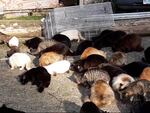
Joe Hodge, 93, often drives down to the harbor in Brookings to watch the world go by. He used to enjoy watching the cats here, but the colony was removed recently.
Kristian Foden-Vencil / OPB
From the driver’s seat of his minivan, retired mechanic Joe Hodge watches the fishing boats head into the harbor in Brookings. He’s 93 and has lost his wife, so he comes here to watch the world go by.
He used to enjoy watching the feral cats that lived here, too, before the small feline colony was removed.
“The cats were pretty,” Hodge said. “People came in and made sure they got fresh water and food and so forth. The cats looked good.”
For years, people who didn’t want to keep their pets would leave them here at the docks. But over the last few months, a dozen cats or more have been caught, spayed or neutered and relocated.
For years, jetty cats have been part of coastal culture, dating back to the days when local leaders didn’t mind them hanging around to gorge on fish parts left behind by fishermen, French fries tossed by tourists or even cat food left by well-intentioned animal lovers. There are colonies in communities up and down the West Coast.
But now, a number of Oregon coastal towns, including Brookings, have taken steps to remove cat colonies; animal lovers say they’re inhumane and a nuisance.
Hodge remembers another colony, about 30 miles up the shore on Gold Beach’s north jetty, that came complete with a row of little, painted houses that locals built decades ago.
“They had churches and grocery stores and hotels, and all kinds of stuff,” Hodge said.

These are some of the very last cats collected from the Gold Beach jetty this spring. All were spayed, neutered, vaccinated and dewormed. Some went to homes, others to stores or barns, and some were taken to an animal sanctuary in Florence.
Jude Wickley
But over time the paint on the little houses peeled and the wood rotted. Cat food left by locals attracted rats and other wildlife.
Bo Shindler lives just up the hill from the Gold Beach colony and said he initially enjoyed the cats, like the time he found kittens in his wood shed.
“I flicked the light on and went to reach for the firewood and the cat and these kittens were sleeping on top of the firewood,” he said. “It scared the living daylights out of them and when they jumped, it scared the living daylights out of me.”
Over the years, he said, problems developed. People started dumping trash nearby. He also accidentally killed three cats on three separate occasions because they were seeking warmth under the hood of his car when he started the engine.
Shindler said the whole place became a nuisance.
“It brands that north jetty as a place where, I don’t know what you want to call it, it’s a no-man’s land,” he said.

Bo Shindler and his granddaughter overlook the jetty where the Gold Beach jetty cats used to live.
Kristian Foden-Vencil / OPB
Local cat enthusiasts noticed the peeling paint and the rot. They banded together to refurbish the houses. But Shindler and other neighbors had seen enough.
“It was a real nasty kind of political-ish type of incident that happened,” said Amanda Trover, director of the Wild Rivers Animal Rescue in Gold Beach. The shelter deals with feral cats in the area.
“They worked really hard to get all the cats out and adopted, fixed, put up into barns. If they were social, they got them into homes,” Trover said of the people who cleared the cat houses. “They busted their butts and did what probably should have happened a long time ago.”
Feral cats are great mousers. They’ve learned how to hunt in the wild. But those qualities often mean they don’t take kindly to domestic life.

Amanda Trover directs the Wild Rivers Animal Rescue shelter in Gold Beach. She's pleased the colony of feral cats has been removed.
Kristian Foden-Vencil / OPB
Trover thinks society has moved on from the quaint notion that waterfronts are a good place for cats because they’re close to fish.
“Some of the old-school people think that it’s fine for the cats just to roam loose. And then the new age, they are like: ‘No, let’s get them fixed. Let’s get them real homes, real families,’” Trover said.
There is no concerted effort to shut down all jetty cat colonies. It’s a more organic embrace of trapping, spaying, neutering and relocating.
In fact, not every town is removing its cat colonies. In Port Orford, there’s been a group of cats living near Ray’s Grocery Store for years. Jude Wickley has been working with locals to trap, spay or neuter and rehabilitate the cats. Now seven remain, and they’ve all been fixed.
“The most humane way to quell the problem is to trap, neuter and release,” Wickley said. “The colonies will eventually die out. If you just eliminate the cats, that’s not going to eliminate the problem.”
Back in Brookings, Joe Hodge misses the cats, and the skunks, coyotes, rats, crows, seagulls, opossums and racoons that all used to enjoy the free cat food left where the feral cats used to live.
“Why do we want to get rid of everything except the thing that you or I want?” Hodge said. “We’re changing the balance throughout the whole world.”
At age 93, Hoge has probably earned the right to be philosophical. But for everyone else, it may be that the time has come to balance the advantages of dropping off an inconvenient pet against the knowledge that one cat can produce 24 kittens in a single year.

Site of the former jetty cat colony in Brookings, Ore.
Kristian Foden-Vencil / OPB
